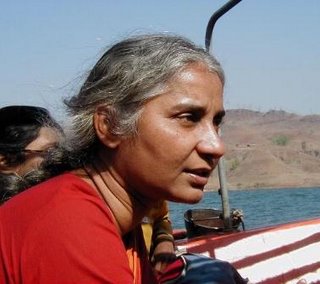
For Medha Patkar
I have written from time to time about various dates which are significant for me.
Among them is today’s date, 28 September.
28 September for me connotes unremitting struggle, for justice, for the oppressed.
The link for me between this date and its meaning - lies in an event on this date, in 1989. This was a massive people’s rally in Harsud, a small town in the state of Madhya Pradesh in India, asserting the will of the people who were going to be ousted and displaced by the Narmada Valley Dams Project:
We shall drown, but we shall not move!
Much water has flown along the dammed Narmada river (the most sacred river in Hindu religious consciousness) since 28 September 1989. And that ancient town of Harsud itself went under-water, in 2004.
But for me that date, and the personal meaning derived from that immense gathering in Harsud of Indian citizen activists and toiling, marginalised people, supported by thousands of others across the country through their local solidarity actions, and the fierce resolve asserted there (and tested repeatedly thereafter) – remains alive, enough to remind me of the struggle for justice whenever I come across the numbers 28 and 9.
Thanks to my association with people like Dr MKA Siddiqui, I have learnt that this is what jihad (in Islam) means: struggle for justice for the oppressed.
An activist, a person with the disposition of working with and for the victims of injustice, struggling for justice – is a jihadi; a struggler for justice is a mujahid, and the term to describe the activism of strugglers for justice would literally translate to Harkat-ul Mujahideen.
Out of his kindly and affectionate disposition, Dr Siddiqui had once told me that I was a true jihadi. No compliment could ever be sweeter and richer!
Post-script: I just learnt, thanks to the website of the International Institute of Social History, that on 28 September 1864, the Saint Martins meeting hall in London was packed to the roof with craftsmen and workers from various countries. The proposal to establish an International Working Men's Association met with great enthusiasm. Karl Marx did not belong to the organizers and was not among the speakers, but he was a member of the presidium and he was chosen (with 54 other persons) in the Preparatory Committee to extend the IWMA. Not before long he would pull the strings of this First International.


4 comments:
Here in the United States the Tennessee Valley Authority built a huge series of dams for electric power, displacing hundreds of families, who had to move away. Things change, and life moves on, sometimes at great personal costs. But, hospitals, schools, factories, and other facilities benefited from this sacrifice.
I appreciate your links here on jihad....
It's good that this dam was built. India needs many more dams and factories. People like Medha Patkar are basically old time socialists who only know how to agitate. They do cannot do anything constructive. They are like the BJP. While the BJP wants us to use cow dung for everything, the socialist backwards like Ms Patkar want us to live in caves and ride bullock carts. The right wing (BJP/RSS/VHP) and left wing fundoos (Socialists/Communists/Leftists/Medha Patkar) of India are holding up India's progress. The quicker people see through their evil designs and foolishness the better for India.
Hullo Bonita. Thanks for your comment. In India the key issue is the historically entrenched, systemic, callous, destructive state and social apathy towards the question of resettlement and rehabilitation. The oustees were simply seen as a section who could be kicked out and forgotten. Sounds hard to believe, but that's how its been. Hence, through struggles like the one against the Narmada dam, as well as others elsewhere in the country, today there is greater compulsion on the part of authorities to take the resettlemet issue more seriously. We also have private multinational companies' interest in areas, e.g for mining. This too has serious displacement and ecological damage effects, which are sought to be brushed under the carpet, and the state becomes a simple agent for such companies, to hand over the site to them, often using brutal force against local protesters. Until such foreign interest in such places, they would typically have been languishing, in the face of state apathy over decades to their local development.
Besides the question of justice after displacement, there's also the issue of alternative economic paradigms which the Narmada movement has thrown up, of a socially just and environmentally sound economic system. And that's a global issue, not just one of India. And its also something the world can ignore only to its own detriment.
Best, rama
Anonymous, thanks for your visit and for expressing your views.
Bes, rama
Post a Comment